| SHADOWS ON THE WALL | REVIEWS | NEWS | FESTIVAL | AWARDS | Q&A | ABOUT | TALKBACK | |||||
 Shadows off the beaten path Shadows off the beaten pathIndies, foreign, docs and shorts...
On this page:
THE LOVE THAT REMAINS |
ROMERIA |
TWO PROSECUTORS
| |||||
| See also: SHADOWS FILM FESTIVAL | Last update 8.Oct.25 | |||||
|
The Love That Remains Ástin sem Eftir Er Review by Rich Cline | 
| |||||
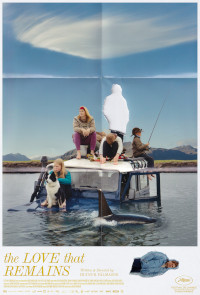 dir-scr Hlynur Palmason prd Remi Burah, Katrin Pors, Anton Mani Svansson with Sverrir Gudnason, Saga Gardarsdottir, Ida Mekkin Hlynsdottir, Kristinn Gudmundsson, Grimur Hlynsson, Thorgils Hlynsson, Ingvar Sigurdsson, Anders Mossling, Halldor Laxness Halldorsson, Katla M Thorgeirsdottir release UK Oct.25 lff, US Oct.25 nyff 25/Iceland 1h49 CANNES FILM FEST TORONTO FILM FEST  Is it streaming? |
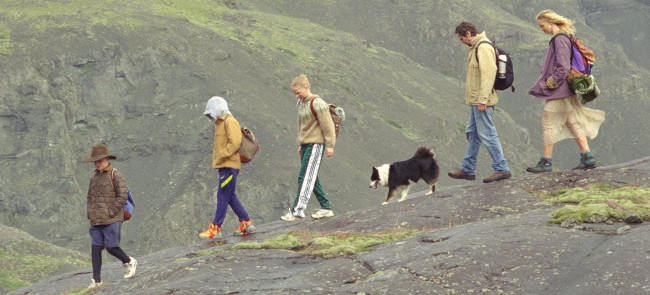 Weaving together a bittersweet collage of scenes from a family's life, observant Icelandic filmmaker Hlynur Palmason takes the audience on an evocative journey through a mixture of very real feelings, shifting between soaring joy and bleak darkness. The film's eye-catching imagery grows increasingly surreal, cutting through the warm surfaces to reveal churning undercurrents. This is a mesmerising and decidedly artistic slice of life that resonates in surprising ways. As they define the terms of their separation, Magnus (Gudnason) and Anna (Gardarsdottir) remain closely involved in family life over the course of a year. Teen Ida (Hlynsdottir) and younger twins Grimur and Thorgils (the Hlynssons), are also navigating this reality while remaining strongly connected to nature. Ida has a horse, the family raises chickens, and they take regular hikes to forests, mountains, seasides and waterfalls. But Anna doesn't want Magnus to stay the night anymore. And when he's away working on an industrial fishing boat, she gets on with her work as a painter. Scenes connect with offbeat metaphorical cutaways, such as the family jeep sinking into the bay or the ongoing construction of a medieval knight figure, which the boys use for archery practice before it comes to life. There's also a scene featuring a man-sized rooster. Several moments are almost comically fantastical, even as everything is grounded in earthy emotion. Each family member expresses intense individualistic feelings, understanding that they need to get through this somehow. The actors find unexpected rhythms, creating characters with layers of personality and emotion. Gudnason plays Magnus as a man who feels like he's being removed from the family he loves, which increasingly isolates him from his identity. By contrast, Gardarsdottir plays Anna as a woman who embraces her new personal freedom, especially in her work. And each of the siblings also has his or her own vivid internal life. As does the family's outrageously engaging dog Panda, who very nearly walks off with the entire film. Scenes are staged and played in ways that continually offer insight, both visually and thematically, into the underlying feelings these people find it difficult to express. Some of these images are a bit on-the-nose, such as leaving Magnus adrift at sea, awaiting collection by a passing boat. But both the wider implications and the more intimate realities carry a powerful punch. So even if we're never sure what has actually happened to tear this family apart, the honest emotions are vividly resonant.
| ||||
|
Romería Review by Rich Cline | 
| |||||
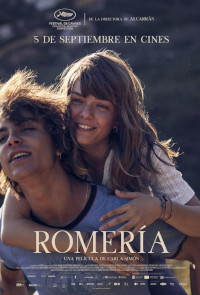 dir-scr Carla Simon prd Olimpia Pont Chafer, María Zamora with Llucia Garcia, Mitch, Tristan Ulloa, Miryam Gallego, Sara Casasnovas, Alberto Gracia, Celine Tyll, Janet Novas, Marina Troncoso, Jose Angel Egido, Tono Casais, Sergio Quintana release Sp 5.Sep.25, UK Oct.25 lff, US Oct.25 nyff 25/Spain 1h54 CANNES FILM FEST  Is it streaming? |
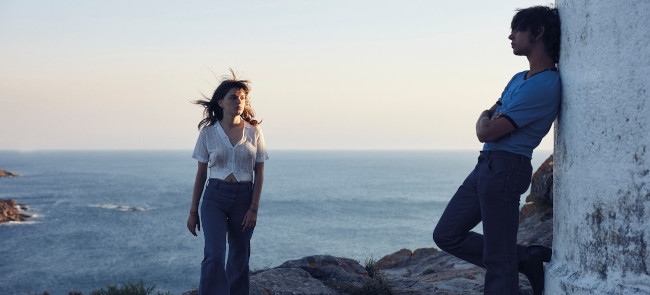 Set on the sunny Atlantic coastline of Galicia, this film's title translates as pilgrimage, and it traces a young woman's journey into her personal history. Writer-director Carla Simon skilfully crafts this involving internal odyssey, playing with both memories and unearthed secrets that swirl into pointed revelations. It's a lovely depiction of family connections, both natural and nurtured, and the characters' expressive emotions continually catch us by surprise. In the summer of 2004, having just turned 18, Marina (Garcia) needs an official document before she can enrol at university. So she heads to the coastal town of Vigo, where her long-deceased biological parents lived in the early 1980s. Using her mother's journal, she retraces steps while connecting with her father's extended family, including her grandparents (Troncoso and Egido), various aunts and uncles, and especially her lively cousin Nuno (Mitch), who is her age. But stories they tell about her parents don't match what she's heard, so she sets out to unearth the truth. Much of the movie takes place on the water, as this family virtually lives on sailboats. Mixed in with Marina's experiences and her own home-video diary are scenes from her parents' Bohemian seaside life (played intriguingly by Garcia and Mitch in dreamy flashbacks), selling and using drugs, then dying as a result of Aids not long after Marina was born. She was raised by an adoptive mother in Barcelona, who keeps in touch with her over these momentous days as Marina confirms things she knew and discovers some jarring new facts. All of this is seen through Marina's eyes, swirling past and present together in an effort to provide some clarity about her background. Garcia has an easy likeability that creates superb camaraderie with each of the people she encounters along the way. Aside from Mitch's effortlessly charismatic Nuno, there are friendly but very different uncles (Ulloa and Gracia) and alert but very different aunts (Gallego and Casasnovas). So family scenes bristly with messy authenticity. As with her previous films, Simon infuses this story with elements from her own life, and the autobiographical detail makes everything feel bracingly honest. This also puts Marina's internal quest into perspective. The question for her is whether learning new information about her parents changes who she is. Of course it doesn't. But it does give her clarity about how she wants to move forward and who she wants to be.
| ||||
|
Two Prosecutors Deux Procureurs Review by Rich Cline | 
| |||||
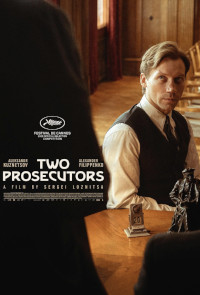 dir-scr Sergey Loznitsa prd Kevin Chneiweiss with Alexander Kuznetsov, Aleksandr Filippenko, Anatoliy Beliy, Vytautas Kaniusonis, Valentin Novopolskij, Ivgeny Terletsky, Lukas Petrauskas, Sergey Podymin, Orest Pasko release US Oct.25 nyff, UK 19.Feb.26 25/France 1h57 CANNES FILM FEST TORONTO FILM FEST  Is it streaming? |
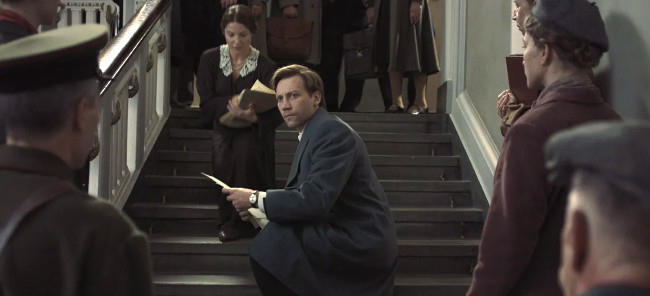 Astute Ukrainian filmmaker Sergey Loznitsa returns to the Soviet era for a pitch-black comedy that elicits chills rather than laughter. This is a Kafkaesque tale that is laced with bitter irony, exploring ideas of justice and legacy through situations that sneak up on us with their present-day resonance. At the centre is a riveting depiction of a government that is knowingly destroying its most loyal citizens, and itself. In the administrative city of Bryansk in 1937, young prosecutor Kornev (Kuznetsov) is investigating a cryptic message that was written in blood and somehow got out of the imposing local hard-labour prison. Navigating layers of resistance, he finally meets inmate Stepniak (Filippenko), and Kornev is horrified to learn that local police and prison guards are torturing political prisoners to sign false confessions. Unable to convey this to his corrupt boss, Kornev heads directly to the top, Chief Prosecutor Vyshinsky (Beliy) in Moscow. But he must surmount imposingly obstructive levels of bureaucracy simply to be heard. With appropriately muted design and witty camerawork, the film continually plays up obstacles in Kornev's way, from a staggering succession of prison gates and scowling guards to the ministry's seemingly endless stairwell lined with bustling bureaucrats. People along the way add further intrigue, including the salt of the earth in the working-class train carriage and too-jolly companions in first class. And the waiting room sequence in Moscow is a classic collision of youthful idealism against the immovable force of authoritarianism. This idea infuses the film, thanks to Kuznetsov's wonderfully open-handed performance. It's clear that Kornev is a straight arrow, so everyone treats him as a threat. But Kuznetsov played him as someone who simply believes that justice will always prevail over evil. This makes us root for him even though it's obvious that he might as well be tilting at windmills. The smiling backstabbers he faces are unnervingly confident in their ruthless power. By contrast, Filippenko gives a grippingly soulful turn as the veteran party member who is now a prisoner of the people he put into power. And of course this cuts to the core of how autocratic systems work: because they rule based on fear, they always destroy their own. It's both amusing and chilling to see these ideas presented in such a deadpan way on-screen. And it leaves us shaking our heads at how stupid even the smartest people in the world can be.
| ||||

See also: SHADOWS FILM FESTIVAL © 2025 by Rich Cline, Shadows
on the Wall
HOME | REVIEWS | NEWS | FESTIVAL | AWARDS
| Q&A | ABOUT | TALKBACK | | ||||

